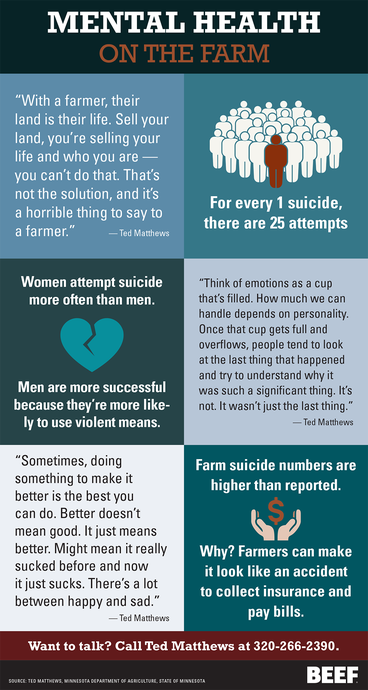On ag & depression — addressing mental health issues in our community
As ongoing challenges threaten family farms, there’s an increased awareness in promoting mental health and wellness in agricultural communities.
April 29, 2019

If farming and ranching were easy, everyone would do it.
Producers are independent and resilient people. However, even the toughest among us are facing nearly insurmountable challenges, particularly if you’re looking at the crop and dairy industries.
In the last couple of years, producers have faced incredible challenges — ongoing trade wars, market uncertainties, increasingly high debt load, the challenge of transitioning the farm while also having a nest egg for retirement, Mother Nature’s brutality with blizzards, wildfires, floods and hurricanes, activist threats, retailer demands, consumer misconceptions and the list goes on.
There’s no doubt about it, farmers and ranchers may find themselves in a tough spot right now. Not only is the family business in danger of collapsing, but the farmer himself may lose his identity, as well.
There’s grief, depression, anger, blame, resentment and a feeling of failure. Production agriculture can be isolating, which tends to intensify these feelings.
 In recent months, there’s been a heightened focus on mental health issues within the agricultural community. I wish I could fix the root cause of the problem; however, in the meantime, I think it’s important to share the available resources out there that discuss depression and suicide.
In recent months, there’s been a heightened focus on mental health issues within the agricultural community. I wish I could fix the root cause of the problem; however, in the meantime, I think it’s important to share the available resources out there that discuss depression and suicide.
For starters, if you or someone you know is going through a difficult time right now, know there is help available. For free and confidential assistance, contact the National Suicide Prevention Lifeline at 1-800-273-8255 or the Avera Farmers Stress Hotline at 800-691-4336. Additional assistance can be found through the experts at FarmAid — call 800-FARM-AID.
Secondly, I’ve rounded up a list of articles that have been recently published on the topic. Perhaps you’ll gain insight to this growing problem in our agricultural community. Maybe you can relate to the subjects in this story. Or quite possibly, by sharing this blog post, you may help someone who really needs it.
Whether it’s grief, depression, suicidal thoughts or family members dealing with trauma or loss, these articles may be helpful resources to you, or at the very least, a point of reference to further understand what others may be going through.
1. “I Work With Suicidal Farmers. It’s Becoming Too Much to Bear” by Mike Rosmann for The New Republic
Rosmann writes, “I serve as a counselor for farmers and ranchers. I’m probably on the phone or on email anywhere from 15 to 25 hours a week, seven days a week, trying to respond to requests for help from all around the country.
“I only take on the most difficult and unresolvable problems that you could ever see among farm people, where depression has not been successfully treated by any kind of medication or psychiatric help. I try to figure out what to do about them, because—well, I don’t know how else to say this, except that I have a lot of experience doing this. It gets me going.”
2. VIDEO: “The Surprising Reality of Depression and Suicide Among Farmers” featured on HuffPost
Watch the emotional video clip by clicking here.
3. “10 truths about how farm families talk” by Holly Spangler for Prairie Farmer
Spangler writes, “Life has changed on the farm in the past 25 years. Here’s what it means for how we talk to each other. Or, you know, don’t talk to each other.”
4. “Why do farmers commit suicide” by Holly Spangler for Prairie Farmer
“Desperation, pressure and lack of communication mount. Here’s a look at what really happens, plus what a veteran farm counselor says you can do to help,” says Spangler.
5. “All the land between happy and sad” by Holly Spangler for Prairie Farmer
“If a farmer in crisis won’t call a hotline, what do you do?” asks Spangler. “Call Ted. He’s talked to more desperate farmers than you can imagine; here’s what he’s learned.”
6. “Grief: What really helps” by Holly Spangler for Prairie Farmer
“When Josh and Tiffany Flint lost their young son to a rare and aggressive cancer, they had to rebuild a crumbled world,” writes Spangler. “Here’s what they learned, and how you can help friends in crisis.”
7. “What a professional says about grief” by Tom J Bechman for Indiana Prairie Farmer
“A mental health professional answers questions about the grieving process after the loss of a child,” writes Bechman.
8. “Ag’s No. 1 ambassador made most of his time” by Tom J Bechman for Indiana Prairie Farmer
“Six-year-old Travis Wenning never missed a chance to talk about agriculture and no-till,” says Bechman.
9. “American farmers confront a mental health crisis” by Mario Parker for Bloomberg
Parker writes, “The worst agricultural downturn since the 1980s is taking its toll on the emotional well-being of American farmers.”
After reading these articles, ask yourself if you can see a loved one or a neighbor who may be going through similar challenges and experiencing these types of emotions. Reach out. Don’t let them suffer alone. Check in. Help lighten the load. Be a friend with a shoulder to cry on. Pray.
Mental health issues have been largely ignored by the rugged and fiercely independent farmers and ranchers in our community. However, life presents ups and downs, and it’s OK to ask for help. It really is. Share this blog post to help spread the word and raise awareness.
The opinions of Amanda Radke are not necessarily those of beefmagazine.com or Farm Progress.
About the Author(s)
You May Also Like




.png?width=300&auto=webp&quality=80&disable=upscale)
